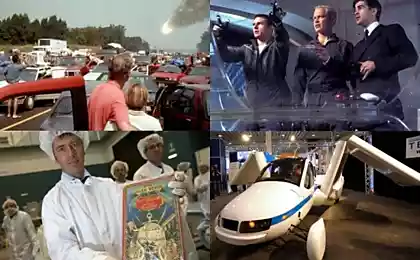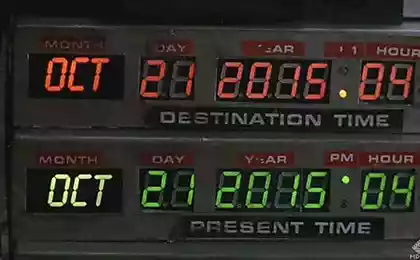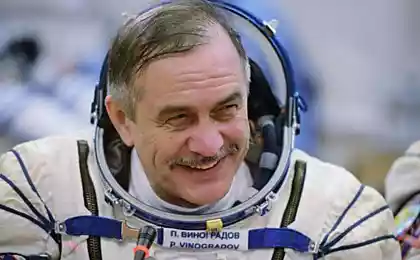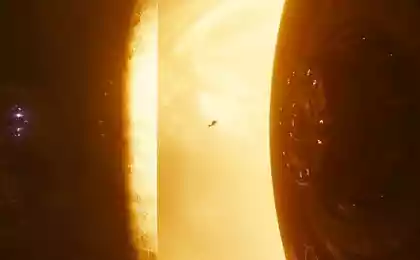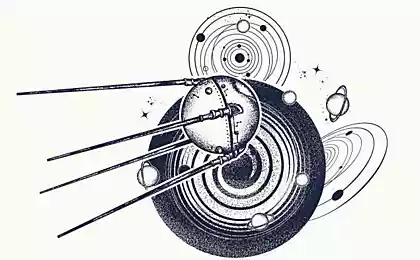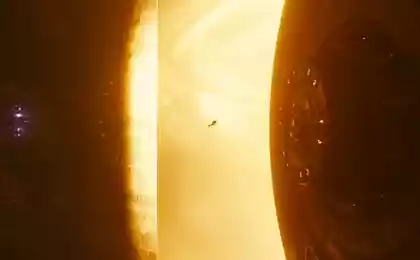771
Things of fiction that became everyday reality
Top 10 things out of science fiction films of the past, which today became a reality. Watch and read more.
1. The virus is capable of destroying mankind
"War of the Worlds Z», «I - a legend," "28 Days Later," "Resident Evil»
Dutch scientist Ron Fouche can claim the title of Dr. Evil. He and a team of scientists has created a virus that could destroy the entire human civilization. During experiments with the virus H5N1, better known as "bird flu", he got a thousand times more dangerous infection. Adding just five mutations in the H5N1 strain has contributed to the fact that in a few hours this virus can be infected several million people. The study has generated heated debate among scientists, many of whom felt that information about the virus should not be published as it could be used by terrorists as a biological weapon. However, in June 2012, the journal Science published a paper still Fouche, - experts decided that the benefits outweigh the risks of publication.

2. Cars without drivers
"Minority Report," "I, Robot", "5th Element»
In science fiction often appear cars that go on automatic pilot - such, for example, was in "Minority Report" and "I, Robot." Meanwhile, Google, which is actively engaged in the development of unmanned vehicle technology, has begun testing these machines in 2010. The system uses the information collected by the service Google Street View, as well as video cameras, sensor LIDAR, installed on the roof, radar in the front of a car and a sensor connected to one of the rear wheels, which helps determine the position of the vehicle on the map. The project involves 10 cars: 6 Toyota Prius, Lexus RX460h and 3 1 Audi TT, in total, they traveled around half a million kilometers. The only accident occurred when another car drove into guglmobil standing at a traffic light. The only problem - the car can not move around in the pouring rain or snow-covered terrain, since the identification of the area is made by comparing the images from Google Street View with the results visualization of the surrounding landscape. Not to be left behind, Volvo has recently developed and successfully tested its own "Caravan technology." In the experiment, three cars, accompanied by a couple of trucks traveled 200 km on the highway, and the driver ran only one car, and the other followed him automatically.
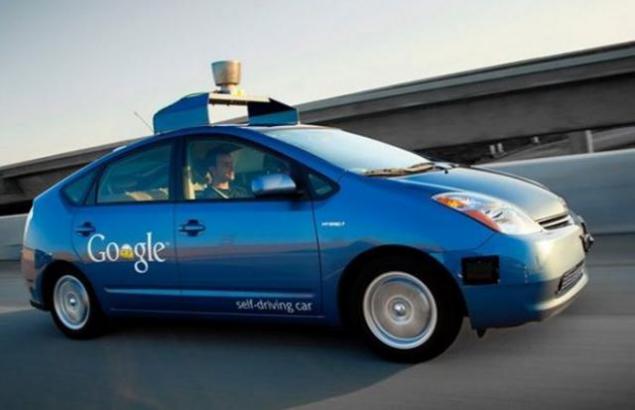
3. Eternal information storage
"The Time Machine»
In the through the 2002 movie "The Time Machine" genius scientist gets into the distant future, - 802,701 a year when technocracy century passed away. He discovers the ruins of a building with a hologram, which has about eight thousand years - at this moment the audience sighed with the idea that any medium can store data as long. Recently, however, the Japanese company Hitachi has introduced a new type of optical media that can store data practically forever - "hundreds of millions of years." The thin plate made of transparent quartz glass will withstand temperatures up to 1000 ° C for several hours, water resistant, resistant to chemicals. The binary code is recorded in the four-layer laser dots which are visible in ordinary light microscope. On one plate 2x2 cm and a thickness of 2 millimeters fit is only 25 megabytes.
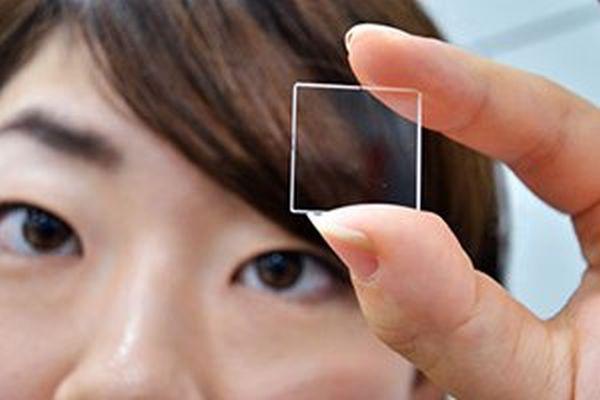
4. Flying mikrodrony
"Batteries not included»
It would seem that could be worse than the humanoid robot Boston Dynamics? Unless mikrodrony - drones the size of a fly that can take photos, listen and even take you DNA samples without your knowledge. Harvard created a miniature robot RoboBee, whose weight is only 80 mg. It flies using the wings that make for a minute about 7200 strokes. The wings are driven by so-called "muscles" that reduced 120 times per second - a rate previously could show only living systems. These muscles are likely piezoelectric components motorized actuated discharge current. Mikrodrony also equipped with a stabilization system and the definition of obstacles - even moving, including the suddenly emerging threats, such as the hands of a man who is going to catch this drone. While it is planned that this "fly" it will be used only for peaceful purposes.
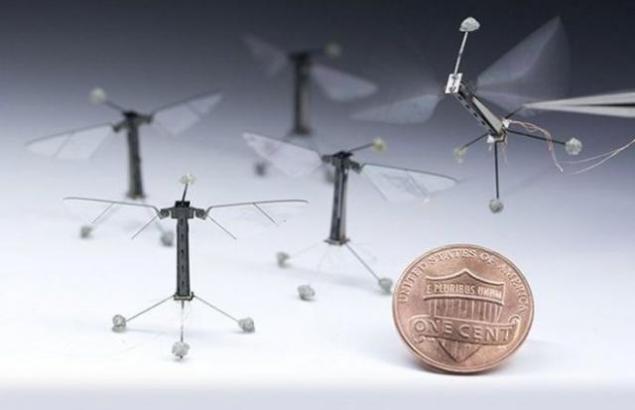
5. Fighting android
"The Terminator," "Transformers," "Ghost in the Shell," "Blade Runner", "Artificial Intelligence»
warriors androids - a frequent character sci-fi movies. The US company Boston Dynamics last spring introduced an updated version of its anthropomorphic robot Petman. His first prototypes showed back in 2009, but since then he has become more "humane": got head, chemical protection suits and gas masks. Moves when he stunningly realistic - Petman squats, press and jumping is not worse than the living (but pretty drunk) soldier. While running android is capable of speeds up to 8 km / h. Development Petman held by order of the Department of Chemical and Biological Defense United States, and its main task is to test the various chemical protective suits and other military equipment. The android built-in sensors, catching dangerous chemicals getting into the suit, in addition, "skin" of the robot is able to "sweat" for the greater reliability of the experiment.
6. bones and organs printed the 3D-printer
"The Fifth Element»
With the development of 3D-printing technology, scientists have learned to print bone. So researchers from Oxford in conjunction with biomedical companies DeFelice conducted a successful operation by implementing a patient from the United States and the implant replacing him 75% of the skull. The missing bones of the skull have been printed the 3D-printer. Previously, these implants treated patients thousands of dollars and were prepared for months, but thanks to the new 3D-printers - bones model costs about $ 150 and is only a week. Engineers at MIT have printed some samples artificial bones, which were 22 times more resistant to fractures and cracks than the biological material. In addition to the bones of 3D-printers print quite successfully authorities: in 2011 at the educational conference TED has created an artificial kidney; In April 2013, scientists from Oxford reported the development of an artificial analogue of nervous tissue, which they have done with the help of 3D-printers modified; San Diego published fragments of artificial liver; and at the University of Princeton in the same way we created bionic ear.
7. The robotic arm that can feel
"Housing massacre" scene from "Terminator»
Experts from the American defense agency Darpa together with researchers Case Western Reserve University in the program (RE-NET) created a high-tech prosthetic hand (literally like Luke Skywalker) with a new interface neuromuscular FINE. Hand controlled by human brain and allows a person to regain not only the course, but also its ability to feel things that it contacts. The prosthesis provides a sufficient sense of each individual finger, which gives disabled people who have lost a limb, to forget about her absence.
8. Eye "Big Brother»
Of all the scenarios of movies about the future most unpleasant events are associated with the government, which is constantly spying on each person. The cameras, placed at each corner, a huge database and face recognition system - that's the recipe of the Department of San Diego, which can every second for any photo or video to identify the person from 4 000 000 options. The technology developed by FaceFirst, and even in a crowd, you can not get away from the eye of "Big Brother". The system can keep track of each individual, and within only a few seconds, "those who need to" get a letter with complete data on violators who quickly find and neutralize the men in uniform.

9. Mission to Mars
Films about how astronauts go to Mars, typed with a couple of dozen. In reality, this program is being developed with the 70s, but only this week, NASA named the names of the eight candidates who will fly to Mars in 2020. After a half years of tests among thousands of applicants (one place candidate claimed 780 people) were selected to 8 people. Team gender equal: four men and four women - all between the ages of 34 to 39 years. It is reported that all of them are high-level professionals in completely different areas: military pilot with the physical form, the test pilot of the Navy, the two test pilot (one with the skills sapper), marine, oceanographer, Doctor of Medicine, specializing in emergency situations and sports medicine, and another physician at Harvard. In August, the group will begin its pre-flight training at a training center in Houston.

10. The tractor beam
"Star Trek»
Remember tractor beam from the TV series "Star Trek", able to move objects in the air? So, experts from the University of St. Andrews in Scotland, together with physicists at the Institute of Instrumentation Czech Academy of Sciences invented a device of the two lasers, computer and a special mirror that can capture particles using a beam. Previously, only able to move individual atoms; Now it became possible to move microparticles of 300-400 nanometers. The device can be used as a "Micro" to move the cell or particle matter. In the future, on the basis of this development, scientists plan to create a device that can move the asteroids or satellites.
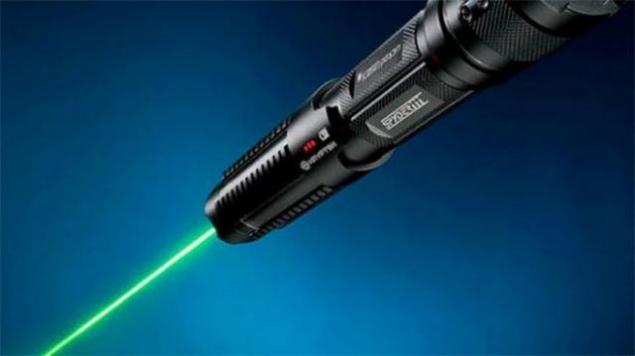
Here
1. The virus is capable of destroying mankind
"War of the Worlds Z», «I - a legend," "28 Days Later," "Resident Evil»
Dutch scientist Ron Fouche can claim the title of Dr. Evil. He and a team of scientists has created a virus that could destroy the entire human civilization. During experiments with the virus H5N1, better known as "bird flu", he got a thousand times more dangerous infection. Adding just five mutations in the H5N1 strain has contributed to the fact that in a few hours this virus can be infected several million people. The study has generated heated debate among scientists, many of whom felt that information about the virus should not be published as it could be used by terrorists as a biological weapon. However, in June 2012, the journal Science published a paper still Fouche, - experts decided that the benefits outweigh the risks of publication.

2. Cars without drivers
"Minority Report," "I, Robot", "5th Element»
In science fiction often appear cars that go on automatic pilot - such, for example, was in "Minority Report" and "I, Robot." Meanwhile, Google, which is actively engaged in the development of unmanned vehicle technology, has begun testing these machines in 2010. The system uses the information collected by the service Google Street View, as well as video cameras, sensor LIDAR, installed on the roof, radar in the front of a car and a sensor connected to one of the rear wheels, which helps determine the position of the vehicle on the map. The project involves 10 cars: 6 Toyota Prius, Lexus RX460h and 3 1 Audi TT, in total, they traveled around half a million kilometers. The only accident occurred when another car drove into guglmobil standing at a traffic light. The only problem - the car can not move around in the pouring rain or snow-covered terrain, since the identification of the area is made by comparing the images from Google Street View with the results visualization of the surrounding landscape. Not to be left behind, Volvo has recently developed and successfully tested its own "Caravan technology." In the experiment, three cars, accompanied by a couple of trucks traveled 200 km on the highway, and the driver ran only one car, and the other followed him automatically.

3. Eternal information storage
"The Time Machine»
In the through the 2002 movie "The Time Machine" genius scientist gets into the distant future, - 802,701 a year when technocracy century passed away. He discovers the ruins of a building with a hologram, which has about eight thousand years - at this moment the audience sighed with the idea that any medium can store data as long. Recently, however, the Japanese company Hitachi has introduced a new type of optical media that can store data practically forever - "hundreds of millions of years." The thin plate made of transparent quartz glass will withstand temperatures up to 1000 ° C for several hours, water resistant, resistant to chemicals. The binary code is recorded in the four-layer laser dots which are visible in ordinary light microscope. On one plate 2x2 cm and a thickness of 2 millimeters fit is only 25 megabytes.

4. Flying mikrodrony
"Batteries not included»
It would seem that could be worse than the humanoid robot Boston Dynamics? Unless mikrodrony - drones the size of a fly that can take photos, listen and even take you DNA samples without your knowledge. Harvard created a miniature robot RoboBee, whose weight is only 80 mg. It flies using the wings that make for a minute about 7200 strokes. The wings are driven by so-called "muscles" that reduced 120 times per second - a rate previously could show only living systems. These muscles are likely piezoelectric components motorized actuated discharge current. Mikrodrony also equipped with a stabilization system and the definition of obstacles - even moving, including the suddenly emerging threats, such as the hands of a man who is going to catch this drone. While it is planned that this "fly" it will be used only for peaceful purposes.

5. Fighting android
"The Terminator," "Transformers," "Ghost in the Shell," "Blade Runner", "Artificial Intelligence»
warriors androids - a frequent character sci-fi movies. The US company Boston Dynamics last spring introduced an updated version of its anthropomorphic robot Petman. His first prototypes showed back in 2009, but since then he has become more "humane": got head, chemical protection suits and gas masks. Moves when he stunningly realistic - Petman squats, press and jumping is not worse than the living (but pretty drunk) soldier. While running android is capable of speeds up to 8 km / h. Development Petman held by order of the Department of Chemical and Biological Defense United States, and its main task is to test the various chemical protective suits and other military equipment. The android built-in sensors, catching dangerous chemicals getting into the suit, in addition, "skin" of the robot is able to "sweat" for the greater reliability of the experiment.
6. bones and organs printed the 3D-printer
"The Fifth Element»
With the development of 3D-printing technology, scientists have learned to print bone. So researchers from Oxford in conjunction with biomedical companies DeFelice conducted a successful operation by implementing a patient from the United States and the implant replacing him 75% of the skull. The missing bones of the skull have been printed the 3D-printer. Previously, these implants treated patients thousands of dollars and were prepared for months, but thanks to the new 3D-printers - bones model costs about $ 150 and is only a week. Engineers at MIT have printed some samples artificial bones, which were 22 times more resistant to fractures and cracks than the biological material. In addition to the bones of 3D-printers print quite successfully authorities: in 2011 at the educational conference TED has created an artificial kidney; In April 2013, scientists from Oxford reported the development of an artificial analogue of nervous tissue, which they have done with the help of 3D-printers modified; San Diego published fragments of artificial liver; and at the University of Princeton in the same way we created bionic ear.
7. The robotic arm that can feel
"Housing massacre" scene from "Terminator»
Experts from the American defense agency Darpa together with researchers Case Western Reserve University in the program (RE-NET) created a high-tech prosthetic hand (literally like Luke Skywalker) with a new interface neuromuscular FINE. Hand controlled by human brain and allows a person to regain not only the course, but also its ability to feel things that it contacts. The prosthesis provides a sufficient sense of each individual finger, which gives disabled people who have lost a limb, to forget about her absence.
8. Eye "Big Brother»
Of all the scenarios of movies about the future most unpleasant events are associated with the government, which is constantly spying on each person. The cameras, placed at each corner, a huge database and face recognition system - that's the recipe of the Department of San Diego, which can every second for any photo or video to identify the person from 4 000 000 options. The technology developed by FaceFirst, and even in a crowd, you can not get away from the eye of "Big Brother". The system can keep track of each individual, and within only a few seconds, "those who need to" get a letter with complete data on violators who quickly find and neutralize the men in uniform.

9. Mission to Mars
Films about how astronauts go to Mars, typed with a couple of dozen. In reality, this program is being developed with the 70s, but only this week, NASA named the names of the eight candidates who will fly to Mars in 2020. After a half years of tests among thousands of applicants (one place candidate claimed 780 people) were selected to 8 people. Team gender equal: four men and four women - all between the ages of 34 to 39 years. It is reported that all of them are high-level professionals in completely different areas: military pilot with the physical form, the test pilot of the Navy, the two test pilot (one with the skills sapper), marine, oceanographer, Doctor of Medicine, specializing in emergency situations and sports medicine, and another physician at Harvard. In August, the group will begin its pre-flight training at a training center in Houston.

10. The tractor beam
"Star Trek»
Remember tractor beam from the TV series "Star Trek", able to move objects in the air? So, experts from the University of St. Andrews in Scotland, together with physicists at the Institute of Instrumentation Czech Academy of Sciences invented a device of the two lasers, computer and a special mirror that can capture particles using a beam. Previously, only able to move individual atoms; Now it became possible to move microparticles of 300-400 nanometers. The device can be used as a "Micro" to move the cell or particle matter. In the future, on the basis of this development, scientists plan to create a device that can move the asteroids or satellites.

Here
